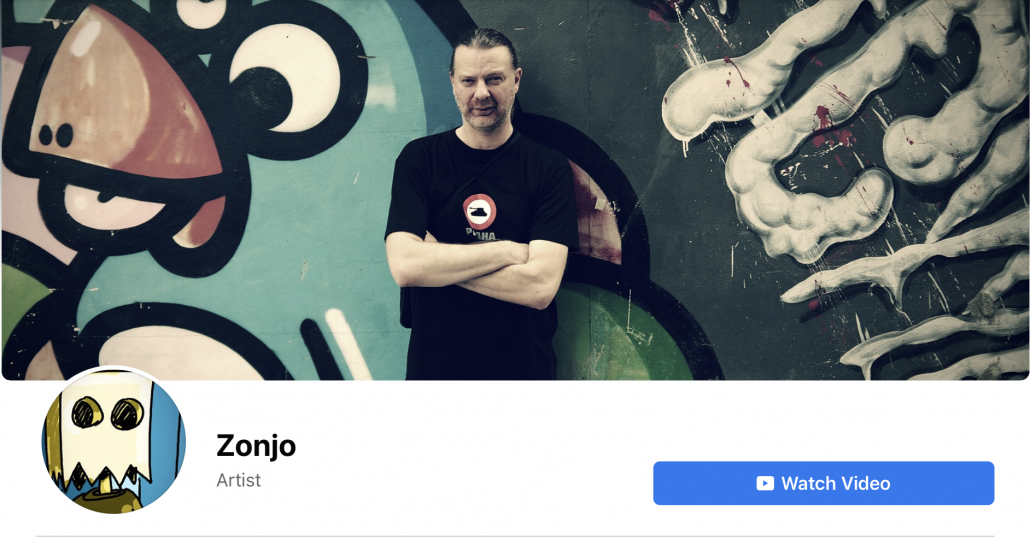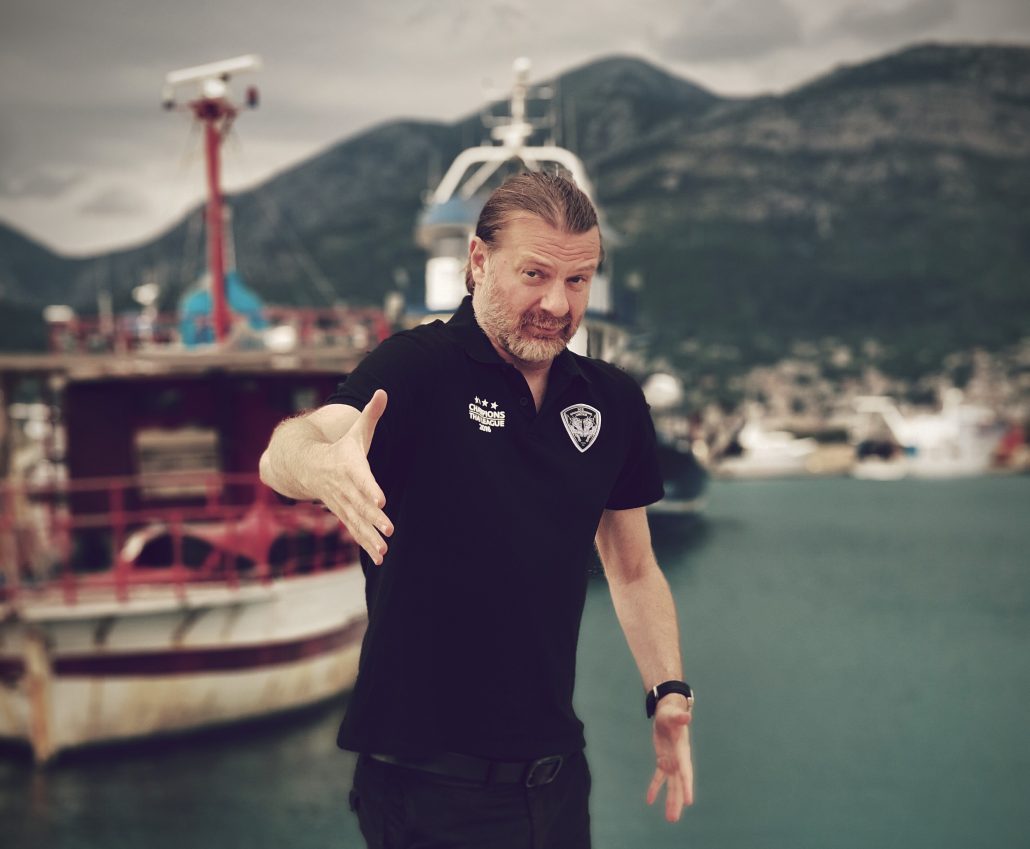Montenegro is the least developed society in Europe when it comes to media and informatics literacy. Instead of searching for reliable information on relevant media, we wait for them to appear on social media, estimated Zoran Markovic Zonjo, director and member of The Books of Knjige (TBOK) organization, in the interview for the DFC Magazine.
Zoran Markovic Zonjo is someone who has been present in the media for ages and who often comments on fake news and conspiracy theories on his Facebook page, which has more than 113,000 followers. This is the reason why he was our best choice for the first interview, which we are publishing in the 20th issue of the DFC Magazine – the anniversary issue.
Markovic considers that the greatest war that has been waging now is the one against fake news, because, as he explained, anyone can create fake news or spread them on their social media accounts. We also discussed why people are more susceptible to believing fake news in the times of a crisis, and the possibilities of improving media literacy in our society.
DFC: Are you familiar with the work of the Digital Forensic Center and how would you assess it? To what extent is the work of such an organization important for society in the fight against disinformation, fake news, and conspiracy theories?
Z. Markovic Zonjo: I have heard about you, but I haven’t been following you until now. Of course, it is important that such an organization exists, which would point out to citizens what disinformation is and what isn’t. The problem is that disinformation had already made harm before being debunked. People, however, tend to memorize the things which appear first. Nothing that comes after has the same effect as the first blow.
Our problem is much media per capita
DFC: How would you assess the Montenegrin media scene and which social media do you follow?
Z. Markovic Zonjo: Media in Montenegro can be better, that is for sure. But compared to those in Serbia, they are small potatoes. There’s a level of seriousness in our country, however, and luckily, the editors of the most prominent media have built a high wall to defend themselves from pap and pablum. Our problem is much media per capita. Those media can’t have financial stability on such a small market, therefore they can’t be immune to political spheres of interest. Now, it is more than clear which media support the government and which the opposition. Only by connecting these two dots, we are able to find the objective thread of a piece of information. When it comes to social media, I’ve been active on Facebook under the nickname ZONJO for over twelve years now, while I started using Instagram this January, under the name ZONJO_. Most of the time I create my own content and I don’t search for relevant information there.

DFC: On which platforms and in which media do you find fake news most frequently?
Z. Markovic Zonjo: Regarding the current media attacks on Montenegro coming from Serbia, it is evident that those are Serbian media and their promoters in our country. They really write a bunch of nonsense. It is interesting to note that every year before the summer season, there is a similar negative campaign going on, which has escalated this year. According to their reporting, every year there was someone eaten by a shark on our coast or a virus that made chaos, or harassment of Serbian tourists. However, the agenda obviously suite the ruling regime both in Serbia and Montenegro, because I can’t see us benefiting either economically or politically by Greeks or Croats making business.
No one has ever apologized to us for fake news
DFC: Have you ever seen fake news or disinformation published about you or your TBOK organization, and what was your reaction to it?
Z. Markovic Zonjo: As far as I can remember now, it happened only once. There was a research text in Monitor, republished by Vijesti, about the Montenegrin Ministry of Culture financing films. The Books of Knjige was lamped together with authors who have been financed by the Ministry for years and haven’t produced any film during that period. The truth was somewhat different. We got the money on paper, but we have never seen any of the cash in reality. While preparing his text, a journalist asked me for a statement, but it was done rather in an unserious way, via the Facebook page. These days, I was very tired and the obligation slipped from my mind, while he went on with the article containing half-information that he got from his source. In the end, fake news was good for us as we made pressure on the Ministry to wire finally the money, and shortly after, we made a film. Unfortunately, the received money wasn’t enough to meet the budget. It is important to note that no one has ever apologized to us for fake news, not even via message on Facebook. I see there a huge flaw of the domestic media. If it occurs that nonsense slips away and is published, then it would seem logical to compensate for the damage with an apology, at least.
DFC: The coronavirus epidemic, both in our country and the world, was followed by many fake news and conspiracy theories. Which of those do you find the most memorable?
Z. Markovic Zonjo: I wouldn’t specify one piece of news, rather a general feeling of a large number of citizens in Montenegro now that the coronavirus is nonsense which shouldn’t cause the world shutdown. This happened due to the influence of many conspiracy theories, but also because of the fact that much greater consequences have spared us. We could use here the old saying: out of sight, out of mind. Many didn’t care about the numbers of the dead or the images of mass graves, because they didn’t see it in person or experienced it firsthand.

People love to believe intriguing information
DFC: During the coronavirus, you wrote that you don’t know whether all those people, who were advocating two months ago that the situation around the novel coronavirus was another media falsehood, are now ashamed of it. Which profile stands out in such rhetoric and are people more susceptible to believing in conspiracy theories and fake news during a state of emergency?
Z. Markovic Zonjo: It seems that people love to believe intriguing information, regardless of the situation, and that somehow stands out particularly in the times of a crisis. I see there two types: a carrier – those super-smarts who what to stand out from the masses, regardless of the reason, and spread conspiracy theories as a sort of their intellectual image. The other group is those people who believe foolishly such nonsense, without any sense of logic. It is interesting to note that those who believe that the COVID-19 wasn’t dangerous are anti-vaxxers by rule, and in a large number of cases procession-supporters too. In other words, those people don’t trust the system, because it has deceived them million times before. When people become existentially wasted, then one trouble more or less means nothing to them.
DFC: During the recent protests in Niksic, there was a photo on social media of an injured baby, with a claim that police beat the boy. To what extent can such manipulation be dangerous, particularly in a sensitive situation the Montenegrin society is now?
Z. Markovic Zonjo: This is a typical example of stirring up the divisions. But, I don’t fall for that and I made jokes about the post. An internal combustion engine called the DPS consumes a great deal of gasoline called pro-Serbian opposition. From time to time, the engine is lubricated by a minor political party, which after certain kilometers simply flows away. The problem with such engines is that they develop little power, literally CRAWLING ALONG. I like to think of me and my friends from the group as windshield washer fluids, which make the road ahead clearer.
DFC: Media literacy research recently done by the DFC showed that the majority of respondents find fake news mostly on social media and news portals. In what way can our society and young people, in particular, become more educated about media literacy?
Z. Markovic Zonjo: I was shocked by revelation two years ago at a regional IT gathering, lectured by the Google director from Southeastern Europe. He then stated that out of all countries in Europe, Facebook exerts the greatest influence in Montenegro. He then added that it is proportional to the development of media and informatics literacy. The more developed a society is, the less influence Facebook has, and vice versa – the less it is developed, the more influential Facebook is. According to that definition, Montenegro is the least developed society in Europe when it comes to media and informatics literacy. Instead of searching for reliable information on the relevant media directly, we wait for them to appear on social media. While waiting lazily, various bots are gladly shoving us different phallic candies, which we’re obviously sucking on with great pleasure.
The only solution – to unplug from the socket
DFC: Do you think that social media are sufficiently dedicated to the protection of those platforms from suspicious posts and what could be improved in that sense?
Z. Markovic Zonjo: The greatest war currently waged on the planet is the war against fake news. The situation, in which anyone can create fake news or spread it on their social media accounts, initially seems way too much for any algorithm to handle. No matter how much the filters are sophisticated, or helped by administrators who remove such news, I think that this task is impossible. Moreover, social media have owners who support this or that administration, so it is also possible to discuss their readiness to fight for the truth until the end. Apparently, the only solution is to unplug oneself from the socket.

